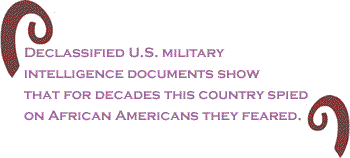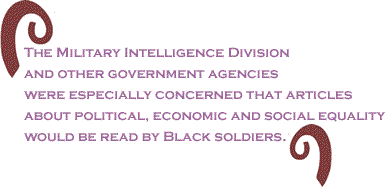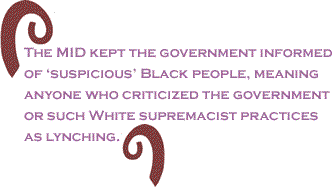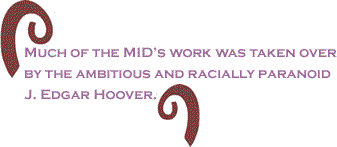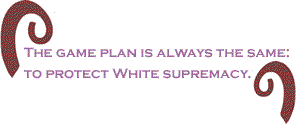
|
|||||||||||||||||||||
 |
|||||||||||||||||||||
 |
|||||||||||||||||||||
 |
|||||||||||||||||||||
 |
|
In a nation built on the foundation of White supremacy, anyone the authorities perceive as threatening that foundation is considered subversive. This has always been true of African Americans who fought for racial equality, and is now equally true for an increasing number of people, including artists, Muslims and anyone who speaks out against this nation's state-sponsored violence and racism. Witch hunts and federal surveillance are therefore nothing new: a fact it is important for all of us to remember. Declassified U.S. military intelligence documents show that for decades this country spied on African Americans they feared, from well-known ones such as W.E.B. DuBois and heavyweight boxing champion Jack Johnson, to farmers attempting to escape the oppression of a sharecropping system that chained them to the land and left them consistently in debt. In World War I, the U.S. government set up a special Military Intelligence Division (MID) in the War Department to monitor people deemed dangerous to the government. (This has very obvious similarities to the massive National Security Administration monitoring of the phone records of U.S. citizens that is going on today.) One of their primary targets was African Americans, especially those in the press, and they routinely followed up leads on "dangerous" Black people. The title of their program showed the racist assumptions and fears that drove their actions: "Negro Subversion."
When a Black newspaper in San Antonio, Texas editorially criticized the government for hanging thirteen soldiers after the Houston riots and sentencing forty-one others to life imprisonment, the U.S. Justice Department charged the editor with violating the Espionage Act because the editorial allegedly attempted "to cause insubordination, disloyalty, mutiny, and refusal of duty." Although the editor hadn't written the editorial and hadn't even been in town when it was published, he was sentenced to two years in the federal penitentiary in Leavenworth, Kansas. (Thanks to the unrelenting efforts of the National Association for the Advancement of Colored People and African Americans throughout the country, the soldiers sentenced to life imprisonment were eventually released. The last one, however, was not released until 1938, thus serving twenty-one years in prison for defending himself against White violence). W.E.B. DuBois was harshly criticized for his writings
about race discrimination. The Crisis, which he edited
for the NAACP, was placed by the MID on a secret list of publications
that were banned from reading rooms used by Black soldiers. The
Crisis and DuBois, along with the writings and activities of
many other Black editors and publications, were placed in a government
file called "Radical Activities." The New York City Officials at MID and other government agencies were especially concerned that articles about political, economic and social equality would be read by Black soldiers returning from fighting for democracy on the battlefields of Europe. "It is feared," read a report by the MID on one such article, "that upon the return of these negroes to their homes in the United States articles of this nature will lead a certain class of the race to strive to attain the dubious ideals of the writer."
In one of the most shocking efforts to keep watch over Black people the government feared, Joel Spingarn, the longtime chairman of the board of the NAACP (and ironically, the creator of the Spingarn Medal for outstanding achievement by African Americans), joined MID as a major. Spingarn then promptly sent a letter to the secretary of the NAACP, John Shillady, asking for a list of all the officers of the national NAACP and of the presidents and secretaries of every local branch throughout the country. The letter was written by Spingarn on behalf of General Churchill. Shillady not only promptly furnished the names of the officers to Spingarn at the War Department, but also provided information on the number of NAACP chapters around the country, the total number of NAACP members, the number of members expected after the latest membership drive, and the names of branches that were currently inactive. Shortly after joining the MID, Spingarn was ordered to investigate a report that "there may be enemy propaganda to stir up colored people" in New Jersey, and was told to "ascertain from responsible colored people" whether or not it was true. Spingarn was also told "not to let anyone know he is doing so in connection with the government inquiry into Negro Subversion." During the "Red Summer of Hate" in 1919, when race riots occurred in twenty-five cities and Black soldiers still in uniform were lynched, the government considered the soldiers a threat and made excuses for the lynchers. The MID kept the government informed of "suspicious" Black people, meaning anyone who criticized the government or such White supremacist practices as lynching and the peonage of Black farmer workers. The latter included Black sharecroppers in Arkansas who organized a union in an attempt to stop White farmers from cheating them. The government sent troops to help the White farmers put down this "rebellion," and after a deputy sheriff was killed, MID officers helped local authorities prosecute and imprison the sharecroppers. Six of them were sentenced to die in the electric chair, after being indicted, tried and convicted in a total of seven minutes. During the next five days, six more of the sharecroppers were condemned to death and eighty were sentenced to prison for terms of from two to twenty years.
When four African Americans were killed in Helena, Arkansas, the Secretary of War for the United States sent a telegram to the commanding general at Fort Pike, Arkansas: "Colored Normal School at Pine Bluff, R.O.T.C. Unit, reported to have 137 rifles and ammunition. Possible trouble feared at time of funeral. Send experienced officer immediately to Pine Bluff to take charge of and hold rifles and ammunition until after funeral. By direction of Secretary of War." Government intelligence agencies continued to keep close watch over Black Americans even after World War I ended. Among those under its surveillance were Marcus Garvey and his Universal Improvement Association, and ex-heavyweight boxing champion, Jack Johnson. Johnson was followed to Mexico, where an MID agent reported back to Washington that a "Mr. Walter Sanborn refused to serve Jack Johnson in a store in Mexico City because he was a negro and three of (Mexican President) Carranza's generals made him apologize." The MID was very worried that "negroes and Mexicans" would join to somehow attack White Americans. With the closing of the MID, much of its work was taken over by the ambitious and racially paranoid J. Edgar Hoover. The Bureau of Investigation he worked for would soon become the Federal Bureau of Investigation. This history goes far in explaining why the FBI later considered Martin Luther King, Jr., Malcolm X and others so dangerous to the White power structure. Therefore, what the government is doing now against African Americans, Muslims and anyone else who challenges their policies, is nothing new. Black people have always lived in a post-9/11 world when it comes to oppression, intimidation and White fear. Their fear that Black soldiers returning from Europe in 1919 would challenge the structure of White supremacy, is the same fear that drove them to strike Black military men and women from the voting rolls in the 2004 presidential election.
According to a recent investigative report by the British Broadcasting Corporation (which, to my knowledge, has not been picked up by the so-called mainstream media in the United States), officials secretly and illegally struck Black military personnel from the voting rolls even while they were fighting for the United States in Iraq. Once they were taken off the rolls, usually without even knowing about it, they could not challenge the latest manifestation of White supremacy in the form of the George Bush presidency. Republican National Committee officials, according to the report, sent letters to the servicemen and women's homes in the United States, even though the officials knew the men and women were overseas. The envelopes had printed on them: "Do Not Forward." Then, when the service people didn't respond to letters they never received, elections officials declared that they were falsely registered and struck them from the rolls. And so, while the methods change, the game plan is always the same: to protect White supremacy, especially as it is manifested through economically and politically powerful White males, from the dangers of "Negro Subversion." The actions of officials today are simply the latest in a line that stretches back to the enslaved men, women and children of centuries past who fought back against their enslavement, and thus were considered "dangerous" and "subversive." But somehow they held onto the belief that this country's promises were also meant for them and their heirs.
Both their determination to be free, and the determination of White supremacists that they never be free, were summed up in a newspaper ad placed by a 19th century slaveowner: "Ran away from the subscriber, a negro lad named Liberty. The fellow may have changed his name." No, he and his fellow descendants have never changed their names and never will. Liberty is still the name and the goal, even if it is once again increasingly considered subversive. Clinton L. Cox is a veteran journalist and inveterate student of Black history, based in upstate New York. Contact him at [email protected]. |
|
| Home | |
Your comments are always welcome. Visit the Contact Us page to send e-Mail or Feedback or Click here to send e-Mail to [email protected] e-Mail re-print notice
If you send us an e-Mail message we may publish all or part of it, unless you tell us it is not for publication. You may also request that we withhold your name. Thank you very much for your readership. |
|
| July 13, 2006 Issue 191 |
||||||||||||||
|
||||||||||||||
|
||||||||||||||
| Printer Friendly Version in resizeable plain text format | ||||||||||||||
 |
||||||||||||||
 |
||||||||||||||
 |
||||||||||||||
 |
||||||||||||||
| |
||||||||||||||
| |
||||||||||||||






















